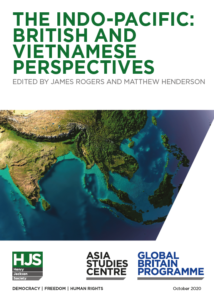 The term ‘Indo-Pacific’ has circulated off-and-on amongst political circles since it was first utilised in 1924, yet it remained relatively sidelined until 2007. Since then, it has returned to political discussions in a reflection of the return of geopolitics perpetuated by the rise of the People’s Republic of China.
The term ‘Indo-Pacific’ has circulated off-and-on amongst political circles since it was first utilised in 1924, yet it remained relatively sidelined until 2007. Since then, it has returned to political discussions in a reflection of the return of geopolitics perpetuated by the rise of the People’s Republic of China.
In this edited collection of essays, the outcome of several months of research, several leading British and Vietnamese voices put forward their perspectives on the geopolitical nature of the Indo-Pacific region.
The introduction, Chapter 1, is written by James Rogers and Matthew Henderson. It outlines what exactly is meant by the term ‘Indo-Pacific’, particularly within geopolitical discourse, and within British and Vietnamese perspectives.
In Chapter 2, James Rogers highlights the increasing integration of the Indo-Pacific region and its emergence as the core of the global political economy. He asserts that this has resulted largely from the de-industrialisation of the West in the late 1960’s and early 1970’s, which has allowed for the Indo-Pacific to become the manufacturing centre of the global economy. Rogers further argues that the continuous growth in power by the PRC presents real concerns for the nations of the Indo-Pacific and asserts that they may come under geopolitical pressure owing to the significant lack of alliances not economic or political in nature.
Chapter 3 sees a discussion by Dr. Tuan Anh To, Deputy Director-General of the East Sea Institute at the Diplomatic Academy of Vietnam, regarding the centrality of Vietnam to the geopolitics of the Indo-Pacific. Dr. To argues that Vietnam is in a unique position to act as a linchpin of cooperation in the region, as opposed to the traditional understanding of a linchpin as wielding power to drive changes. He roots this in two facets of Vietnam’s foreign policy: Vietnam’s focus on peace and security within its foreign and defence policies, and its roles in both regional and international organisations.
Chapter 4, written by Dr. Philip Shetler-Jones, Honorary Research Fellow at the White Rose East Asia Centre at the University of Sheffield, assesses Britain’s role in the Indo-Pacific and highlights that today Britain is increasing its presence in the region in contrast to its withdrawal from the region in the late 20th Century. Dr. Shetler-Jones further argues that in order to align its interests with the Indo-Pacific, which he deems as increasingly necessary owing to Britain’s withdrawal from the EU, Britain must act in new ways in the region. Championing ‘sovereignty’, he argues, will be at the heart of this new strategy.
In Chapter 5, Dr. Son Hung Nguyen, Vice President of the Diplomatic Academy of Vietnam, argues that AEAN, as a collective, is an actor with potentially huge significance for the region. Dr. Nguyen asserts that its promotion of a regional order based on the UN system of state sovereignty and its utilisation of international law as opposed to military power allows ASEAN to function in the region in a manner that no other multilateral agency has been able to do. He goes on to argue that this centrality in the region’s security framework should allow for Britain to work together with ASEAN in order to promote security in the region and to further promote the traditional ‘rules based’ system as an avenue for future cooperation, particularly considering the growing power and threats posed by the PRC.
In Chapter 6, Humphrey Hawksley, the former BBC Beijing Bureau Chief, Asia Correspondent and World Affairs Correspondent, argues that despite the continuous attempts by China to weaken American power, the collection of nations who align themselves with the US in response to the US-China polarisation presents a significant threat to China. This threat is such that he suggests that a more prudent avenue for China to take is to work within the existing international frameworks. Hawksley also argues that the human rights violations occurring in China, and indeed being viewed all over the world, take precedent over economic and trade issues.
The collection is concluded by Matthew Henderson and James Rogers, who highlight the comparable similarities and differences in Indo-Pacific perspectives held by Britain and Vietnam. They point out that despite growing interest in the region, Britain has deep strategic interests across the globe and, as such, it takes a less centred approach to the Indo-Pacific than Vietnam. However, they conclude that despite the differing views on the role of ASEAN in regional politics, both Britain and Vietnam consider the organisation to be key in future economic, political and strategic cooperation.
Read the report here
In the words of the co-Editor
“This collection of essays is essential for understanding the rapid changes of the Indo-Pacific region, and the evolving interest in the region by both internal and external powers. It provides an assessment of both British and Vietnamese perspectives of the geopolitics and stability of the region and demonstrates that despite the differing nature of such perspectives, both nations have vested interests in the region and must work together moving forward.”
James Rogers


